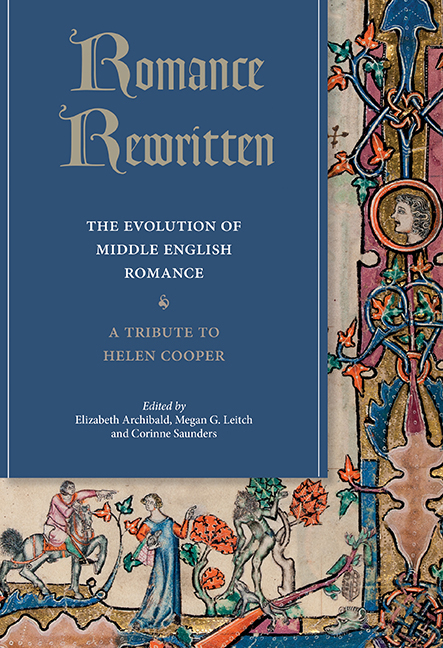Book contents
- Frontmatter
- Dedication
- Contents
- Notes on Contributors
- Acknowledgements
- Introduction. Middle English Romance: The Motifs and the Critics
- I Romance Disruptions
- II Romance and Narrative Strategies
- 4 Beginning with the Ending: Narrative Techniques and their Significance in Chaucer's Knight's Tale
- 5 The Riddle of ‘Apollonius’: ‘A Bok for King Richardes Sake’
- 6 Malory and the Post-Vulgate Cycle
- 7 Towards a Gestural Lexicon of Medieval English Romance
- III Romance and Spiritual Priorities
- IV Late Romance
- Works Cited
- Index
- Volumes Already Published
6 - Malory and the Post-Vulgate Cycle
from II - Romance and Narrative Strategies
Published online by Cambridge University Press: 17 October 2019
- Frontmatter
- Dedication
- Contents
- Notes on Contributors
- Acknowledgements
- Introduction. Middle English Romance: The Motifs and the Critics
- I Romance Disruptions
- II Romance and Narrative Strategies
- 4 Beginning with the Ending: Narrative Techniques and their Significance in Chaucer's Knight's Tale
- 5 The Riddle of ‘Apollonius’: ‘A Bok for King Richardes Sake’
- 6 Malory and the Post-Vulgate Cycle
- 7 Towards a Gestural Lexicon of Medieval English Romance
- III Romance and Spiritual Priorities
- IV Late Romance
- Works Cited
- Index
- Volumes Already Published
Summary
All these episodes are present in his French sources, but Malory's changes of emphasis amount to an ethical restructuring of the whole history of Arthur. His version is not a clash between earthly and divine focused on the issue of sexual sinfulness, but a study of the personal rivalries that underlie political disintegration.
…
Even where Malory is working with a source book in front of him, however, he will not merely translate or ‘reduce’, but invent.
(Helen Cooper)Everyone accepts that Malory followed the Post-Vulgate Suite du Merlin very closely in the first tale of his Morte Darthur, but it has often been assumed that he did not know the rest of the Post-Vulgate Cycle (also known as the Roman du Graal). Very little seems to have been written about the possibility that he did read it all, perhaps because the importance of this now fragmentary cycle has only relatively recently become clearer as Fanni Bogdanow's researches have produced more and more witnesses of parts of the French version – as Richard Trachsler puts it, the cycle has now achieved the ontological status of a codicological reality – and also because parts of the Queste and Mort were only available in Spanish and Portuguese until the appearance of a complete translation of the cycle. E. D. Kennedy seems to be the only critic who regularly refers to the Post-Vulgate cycle in discussing Malory: he thinks that Malory did know at least part of the Post-Vulgate Graal, though possibly through the Prose Tristan, which in its later redaction includes much of the Post-Vulgate Queste: ‘Although Malory may never have read the Post-Vulgate Mort Artu, what he knew of the earlier parts of the Post-Vulgate Roman influenced his conception of the Arthurian tragedy.’ A critic who goes rather further is James Wimsatt, who assumes that Malory knew all three of the major French cycles, the Lancelot-Grail, the Prose Tristan, and the Post-Vulgate. However, he gives little detail to support this argument in relation to the Post-Vulgate Cycle, and his lead has not been followed. Ralph Norris argues that after the ‘Tale of King Arthur’ the Post-Vulgate is only a minor source.
- Type
- Chapter
- Information
- Romance RewrittenThe Evolution of Middle English Romance. A Tribute to Helen Cooper, pp. 115 - 132Publisher: Boydell & BrewerPrint publication year: 2018
- 1
- Cited by



